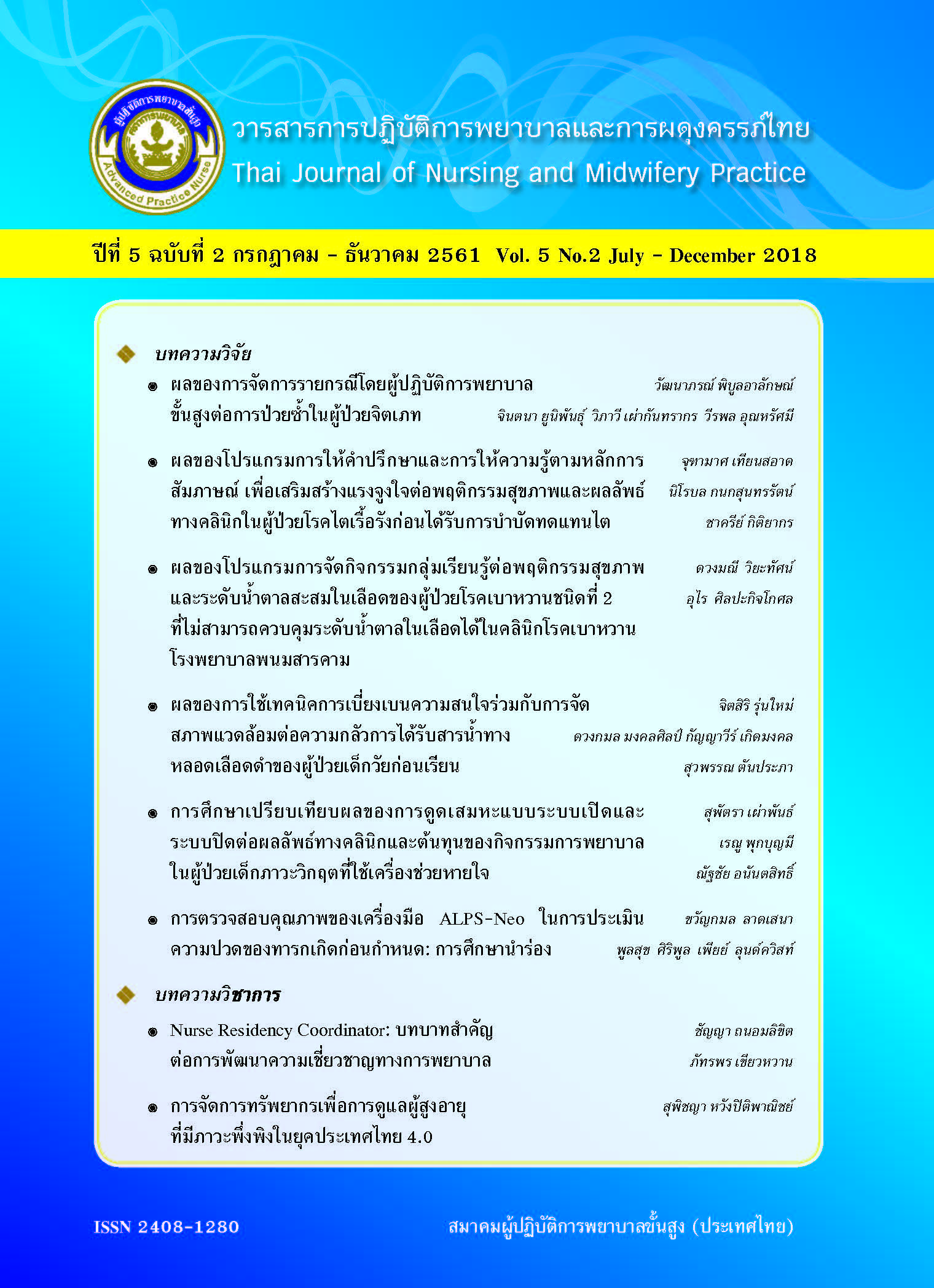Resources Management for Older People with Dependency in Thailand 4.0
Main Article Content
Abstract
Older people with dependency are those who need caregiving from family and community caregivers. Resources management or management of resources could help increase capability of caregivers in order to meet the needs and problems of older people. This leads to expected health outcomes which is health and well-being of older people. This article aimed to present review literature on resources management in caring for older people with dependency in Thailand 4.0. It was found that in caring for older people with dependency to get health and well-being, the readiness of caregivers, the availability of community resources, and equal access to welfares and benefits from both government and private sectors are important. Caregivers need to have caregiving knowledge, skills, and ability to manage various resources appropriately. They have to manage financial, material, and time in order to get balance in caring for older people and caring for themself. Nurses who care for older people with dependency should develop capability in resources management to get the most benefits for older people and their families.
Downloads
Article Details
References
2. Foundation of Thai Gerontology Research and Development institute (TGRI). Situation of Thai elderly 2016. Nakhon Pathom: Printery; 2017. (In Thai)
3. World Health Organization. Integrated care for older people: guidelines on community-level interventions to manage declines in intrinsic capacity. Geneva: 2017.
4. O’Shea E. Improving the quality of life of elderly persons in situations of dependency. Strasbourg Cedex, France: Council of Europe publishing; 2002.
5. Sawatphol C, Pengpinit T, Senanikorn A, Srisuraphol W. Care for elderly dependents in the Northeast of Thailand. Journal of MCU Peace Studies Special Issue 2017; (5): 387-405. (In Thai)
6. Yodpetch S. Community resources and family role to promote healthy aging. In: Veerasak M, editor. Challenges and solutions for health aging. 1st. Nonthaburi: Parbpim printing; 2018. P. 53-61. (In Thai)
7. Gaugler JE, Kane RL. Family caregiving in the new normal. London: Elsevier Inc; 2015.
8. Bureau of Health Administration Ministry of Public Health. Family care team. 2014 [cited 2018 October 12]; Available from: http://kpo.moph.go.th/webkpo/download/FamilyCareTeam_Handbook.pdf. (In Thai)
9. Maesincee S. Concept of Thailand 4.0. 2017 [cited 2018 April 17]; Available from: http://planning2.mju.ac.th/goverment/20111119104835_planning/Doc_25590823143652_358135.pdf
(In Thai)
10. Office of the Royal Society. Dictionary of the Academy B.E. 2554. Bangkok; 2011. (In Thai)
11. Boriboonsuk P, Chatraporn S, Wongsa W. Course materials subject family and community resource management unit 1-7. The office of the university press Sukhothai Thammathirat open university; 2011.
12. Sirapo-ngam Y. (1996). Family caregiver: Concept and research issues. Ramathibodi Nursing Journal 1996; 2(1): 84-94. (In Thai)
13. Lertrat P. Gerontological Nursing: Integration of families in caring for the older person. Khon Kaen: Faculty of Nursing, Khon Kaen University; 2008.
14. Schumacher K, Beck CA, Marren J M. Family caregiving caring for older adults, working with their families. The American Journal of Nursing 2006; 106(8): 40-50.
15. Wangpitipanit S, Panuthai S, Sucamvang K, Lasuka D, Jitapunkul S. Family Caregiver Capacity Building Program for Older People with Dependency in Thailand: A Randomized Controlled Trial. Pacific Rim International Journal of Nursing Research 2018; 20(1): 18-2.
16. Strategy and planning division, ministry of public health. Report on public health resource in the year 2016. [cited 2018 April 27]; Available from: http://bps.moph.go.th/new_bps/sites/default/files/report-gis59_05Jan17.pdf (In Thai)
17. Parakarn J. A case study for agricultural resources management of a farmer: Na Torn. Conference Khon Kaen University Annual Report 2011 "Rural development in Thailand: A sustainable foundation for sustainable development" 27-29 January 2011; 2011: 292-9. (In Thai)
18. JanJam S, Chantachum. Evaluate the performance of managing the elderly welfare policy by Khu Sub–district administrative organization, Chana district, Songkhla province. Al-Nur Journal The Graduate School of Fatoni University 2013; 8(15): 97-106. (In Thai)
19. Thai. Law, the Act on the Elderly, B.E. 2546 (2003 A.D.). [Bangkok]: Department of older persons ministry of social development and human security; 2003.
20. Thai. Law, the Act on the Elderly, B.E. 2550 (No. 3), “The Royal Thai Government Gazette 134) (27 December B.E 2560)” Page 36-9.
21. Internal security affairs bureau, department of provincial administration. Number of mosques to be registered 2015. [cited 2018 April 30]; Available from: http://news.muslimthaipost.com/uploads/2015/12/1/statistics.mosque.jpg (In Thai)
22. Pornsiripong S, Sasiwongsaroch K, Burasit Y. Preparedness of Buddhist temples for an aging society. Journal of language and culture 2014; 33(1): 99-125. (In Thai)
23. Sudsomboon S. Social Welfare for Aging People In Thailand. Journal of Southern Technology 2014; 7(1): 73-82. (In Thai)
24. Anulomsombat M. Senior society can cope with technology 2017. [cited 2018 September 15]; Available from: http://www.bangkokbiznews.com/blog/detail/642056 (In Thai)
25. Punsawad B, Punnakitikashem P, Tungkaprasert P, Laosirihongthong T. Innovative Telecare System for the Elderly. Thai Journal of Nursing Council 2011; 26 (special issue) 5-16. (In Thai)


